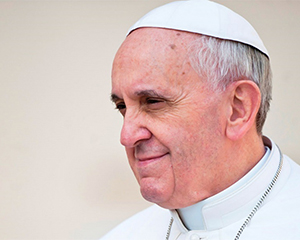Pope Francis’s Radical Environmentalism

Featured Image: Link
As a former teacher, Pope Francis knows how to deliver a stern lecture. On Thursday, he gave one that will not soon be forgotten.
While slamming a slew of modern trends, the heedless worship of technology, our dependence on fossil fuels and compulsive consumerism, the Pope said humanity’s “reckless” behavior has pushed the planet to a perilous “breaking point.” Doomsday predictions,” the Pope warned, “can no longer be met with irony or disdain.”
Citing the scientific consensus that global warming is disturbingly real, Francis left little to the imagination about who to blame. Big businesses, energy companies, short-sighted politicians, economists, indifferent individuals, callous Christians and myopic media professionals. Scarcely any area of society escaped his withering criticism. He called on people and corporations to remember their social and corporate responsibilities towards the environment.
The Earth, our home, is beginning to look more and more like an immense pile of filth, said Francis. In many parts of the planet, the elderly lament that once beautiful landscapes are now covered with rubbish. Francis’ bracing manifesto came Thursday in the form of an encyclical, a letter traditionally addressed from St. Peter’s Square to the more than 1 billion Catholics across the globe. Derived from the Greek word for “circle,” an encyclical is among the church’s most authoritative teaching documents.
But Francis has set his sights far beyond the circle of his church. With an eye toward several key climate change summits scheduled for later this year, the Pope said his letter is addressed to “every person living on this planet.”
“Laudato si” is long on laments and short on specific solutions, though the Pope repeatedly urges deep thinking and dialogue to address the complex problems now troubling the planet. Francis calls for a drastic change in lifestyle, production and consumption from unsustainable habits to more mindful means of caring for the Earth. Though it ends with a prayer, many parts of Francis’ encyclical seem profoundly pessimistic, particularly from a spiritual leader known for his hopeful messages of mercy and openness. People no longer seem to believe that happy days lie ahead, the Pope lamented.
Furthermore he said that one look at the numbers will convince anyone and everyone that the problem we have on our hands will not be dealt with easily. The rich and powerful shut themselves up within self-enclosed enclaves, Francis argues, compulsively consuming the latest goods to feed the emptiness within their hearts, while ignoring the plight of the poor.
The poor, meanwhile, find themselves on the run from natural disasters and degraded habitats, shunted to the bottom of the world’s pile of problems with decreasing access to its natural resources.
Francis saves his most challenging questions for modern consumers, arguing that humanity has become enamored of another apple — and this time no Eve or serpent are around to take the fall. The temptation may have shifted from a forbidden fruit to cutting edge technology, but the sin remains the same: hubris.
“We are not God,” the Pope warns, “The Earth was here before us and has been given to us.”
What is radical is Francis’s willingness to present environmentalism not merely as a challenge, but as one of the “greatest” challenges of our time. By underlining the importance of environmentalism to his overall theology, Francis is doing more than simply espousing a set of principles. He is also publicly—with the dizzying reach granted to a man in his position—emphasizing an understanding of nature that, in contrast to the combative dichotomy so prevalent in mainstream politico-religious discourse, is intrinsically positive in its treatment of the physical world. It’s a vision that is, radically and profoundly, pro-life.
About The Author Kelly Sampson
Kelly Sampson is a writer, blogger, and environmental enthusiast. She has strong opinions about climate change, the dogs vs. cats debate, and Oxford commas. She has lent Hummingbird International her engaging and spirited voice and turned our blog into a great place to find valuable information about e-waste, e-waste recycling, and the ITAD industry. Explore our blog to read more of her work.






